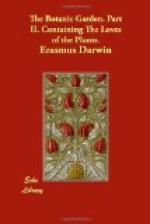Her
tender mind, with meek Religion fraught,
Drank
all-resigned Affliction’s bitter draught;
395 Alive and listening to the whisper’d groan
Of
others’ woes, unconscious of her own!—
One
smiling boy, her last sweet hope, she warms
Hushed
on her bosom, circled in her arms,—
Daughter
of woe! ere morn, in vain caress’d,
400 Clung the cold Babe upon thy milkless breast,
With
feeble cries thy last sad aid required,
Stretch’d
its stiff limbs, and on thy lap expired!—
—Long
with wide eye-lids on her Child she gazed,
And
long to heaven their tearless orbs she raised;
405 Then with quick foot and throbbing heart she
found
Where
Chartreuse open’d deep his holy ground;
[Where Chartreuse. l. 406. During the plague in London, 1665, one pit to receive the dead was dug in the Charter-house, 40 feet long, 16 feet wide, and about 20 feet deep; and in two weeks received 1114 bodies. During this dreadful calamity there were instances of mothers carrying their own children to those public graves, and of people delirious, or in despair from the loss of their friends, who threw themselves alive into these pits. Journal of the Plague-year in 1665, printed for E. Nutt, Royal-Exchange.]
Bore
her last treasure through the midnight gloom,
And
kneeling dropp’d it in the mighty tomb;
“I
follow next!” the frantic mourner said,
410 And living plunged amid the festering dead.
Where
vast Ontario rolls his brineless tides,
And
feeds the trackless forests on his sides,
Fair
CASSIA trembling hears the howling woods,
And
trusts her tawny children to the floods.—
[Rolls his brineless tide. l. 411. Some philosophers have believed that the continent of America was not raised out of the great ocean at so early a period of time as the other continents. One reason for this opinion was, because the great lakes, perhaps nearly as large as the Mediterranean Sea, consist of fresh water. And as the sea-salt seems to have its origin from the destruction of vegetable and animal bodies, washed down by rains, and carried by rivers into lakes or seas; it would seem that this source of sea-salt had not so long existed in that country. There is, however, a more satisfactory way of explaining this circumstance; which is, that the American lakes lie above the level of the ocean, and are hence perpetually desalited by the rivers which run through them; which is not the case with the Mediterranean, into which a current from the main ocean perpetually passes.]




